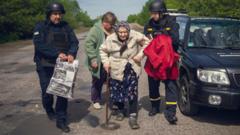As Russian troops reportedly capture villages in northeastern Ukraine's Sumy region, authorities suggest these actions may aim to establish buffer zones along the border. Ukrainian leadership remains cautious, with President Zelensky highlighting preparations for new offensives, but experts believe a major breakthrough by Russia is still unlikely.
Russia Seeks Strategic Buffer Zones as Advances in Sumy Continue

Russia Seeks Strategic Buffer Zones as Advances in Sumy Continue
Russian military operations in the Sumy region of Ukraine have raised concerns of an impending "buffer zone" as Ukrainian officials report territorial gains by Moscow's forces.
Russian forces have been making significant advancements in the northeastern Ukrainian region of Sumy, prompting concerns from local authorities about Moscow's intentions to establish "buffer zones" along the border. Oleh Hryhorov, the head of the Sumy region, noted that Russian troops have seized control of several villages, including Novenke, Basivka, Veselivka, and Zhuravka, while ongoing combat continues nearby.
Russia claims to have captured a total of six villages in Sumy, with President Vladimir Putin recently unveiling a strategy to establish "security buffer zones" adjacent to areas in Ukraine's Kharkiv, Sumy, and Chernihiv regions. In a statement, Hryhorov emphasized that the enemy persists in its attempts to fortify these zones, though official Ukrainian confirmation of Russian troop presence in Sumy has yet to be provided.
Information regarding Russian military movements is highly sensitive for Ukrainian authorities, and the General Staff's briefings have only referenced military activities in the broader "Kursk direction". Despite this, President Zelensky acknowledged Russia's preparation for potential new offensives during a recent address, interpreted as a nod to developments in Sumy.
The Deep State monitoring group had already marked the villages reported by Hryhorov as under Russian control prior to his statements, with co-founder Roman Pohorily indicating that Russian troops have intensified their push in these areas since March. Military observer Kostyantyn Mashovets corroborated this information but noted the slow progress of Russian forces, averaging only about 1 kilometer in the past two weeks.
Colonel Vadym Mysnyk, a spokesperson for ground forces in Sumy, described Russian assaults as primarily conducted by small units using motorbikes and buggies to enhance mobility, avoiding detection by drones. The region has faced frequent airstrikes and artillery attacks, with recent reports indicating over 30 guided bomb drops on Sumy.
Authorities have initiated evacuation procedures in 202 settlements near the front lines, comprising a third of the region's territorial communities. Military expert Serhiy Grabskiy concurs that Russia's activity in Sumy aims to create a buffer zone, diverting attention while maintaining pressure on Ukraine. Although the US-based Institute for the Study of War warns that any gains in Sumy could be leveraged by Putin in future negotiations, experts believe a significant breakthrough remains unlikely, as Russian forces are confined to border areas.
Reports suggest that Ukrainian defenses have strengthened since 2022, stabilizing the front line and enhancing resistance against Russian advances. Observers, including Mr. Pohorily, assert that despite nearly three months of Russian operations, substantial territorial changes have not occurred, leading to expectations of ongoing resistance if Moscow alters its military strategy.





















